7/7 I hope you've found this thread helpful. Follow me @dschiff.bsky.social for more research on AI governance and public opinion.
This paper is for anyone in #TechPolicy, #PoliticalScience, and #PublicEngagement.
Link: doi.org/10.1093/pol...
#AIpolicy #AgendaSetting
04.08.2025 13:57 — 👍 0 🔁 0 💬 0 📌 0
6/7 🤔 Implications: There's broad consensus that we need more public participation to guide AI. But results suggest these calls may be underrealized. Policymakers may engage in a form of confirmation bias, amplifying public discourse only when it aligns with economic priorities.
04.08.2025 13:57 — 👍 0 🔁 0 💬 1 📌 0
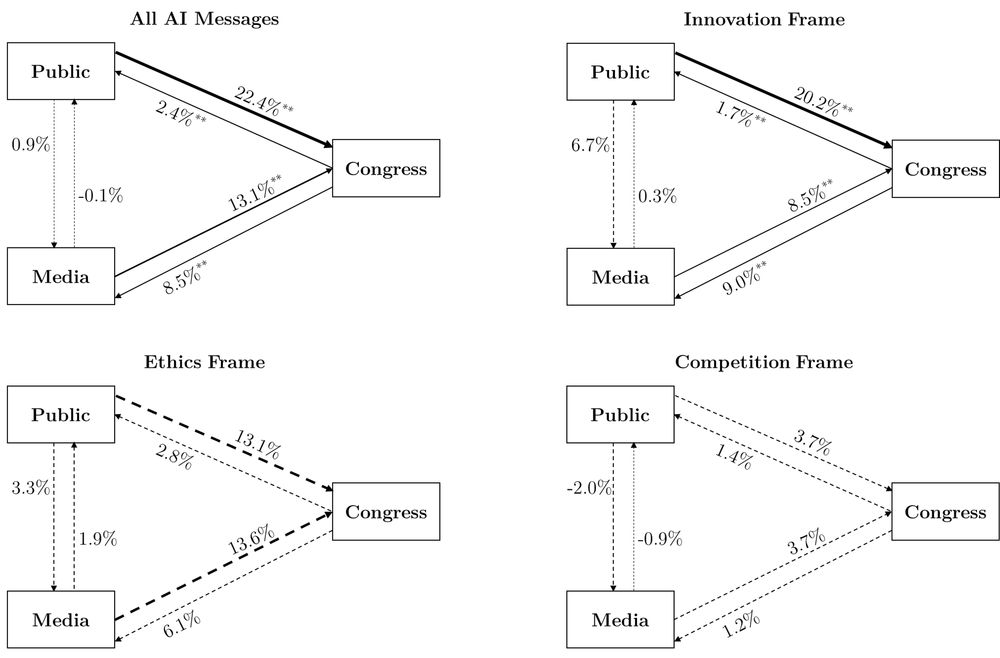
5/7 📈 Finding 2 (The Catch): This public influence ONLY holds for the innovation frame. When the public discusses AI's economic potential, policymakers listen. When the public discusses AI ethics or security, we see no statistically significant influence on policymakers.
04.08.2025 13:57 — 👍 0 🔁 0 💬 1 📌 0
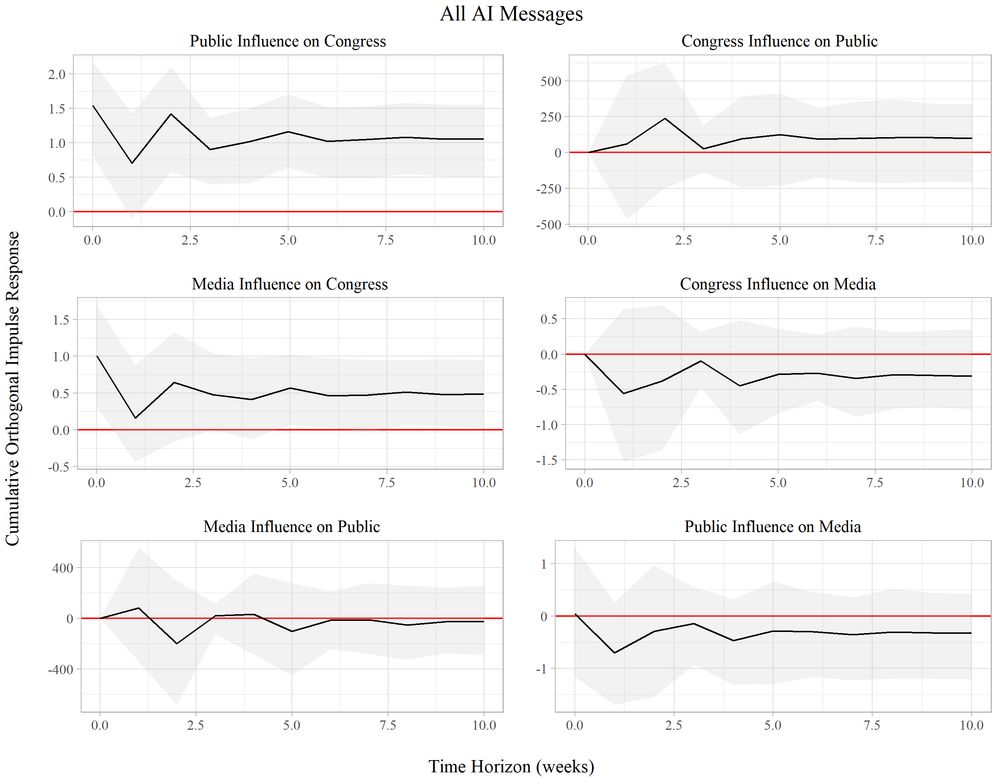
4/7 📈 Finding 1: Public attention does predict policymaker attention.
The time-series analysis (ARIMA + VAR) shows that a one standard deviation increase in public tweets about AI is associated with a 22.4% increase in Congressional messaging on AI that same week.
04.08.2025 13:57 — 👍 0 🔁 0 💬 1 📌 0
3/7 🔧 Methods: My text-as-data approach involved analyzing a dataset of ~5 million tweets using the #AI hashtag and comparing them to all AI-related tweets from the 115th and 116th U.S. Congresses (2017–2019).
This research was conducted at @GRAILcenter.bsky.social and @purduepolsci.bsky.social.
04.08.2025 13:57 — 👍 0 🔁 1 💬 1 📌 0
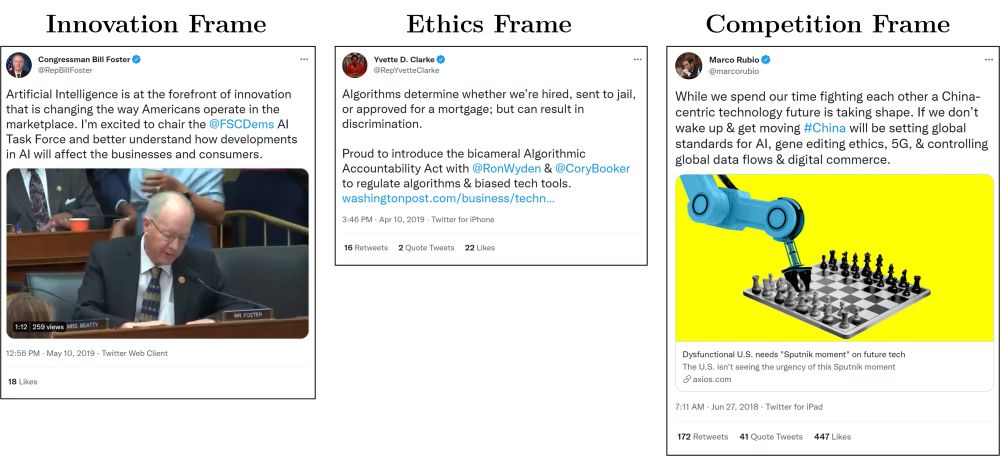
2/7 I focused on three dominant ways people frame AI:
📈 Innovation: AI as a driver of economic growth & productivity.
🙏 Ethics: AI's impact on fairness, rights, bias, and safety.
⚔️ Competition: AI in the context of the US-China race.
04.08.2025 13:57 — 👍 0 🔁 0 💬 1 📌 0
1/7 Does the public actually influence policymakers on #AIpolicy? My paper in @policysociety.bsky.social used 5 million tweets + @nytimes.com articles to find out.
The answer is yes, but with a huge catch that has major implications for #AIethics. 🧵
Link: doi.org/10.1093/pol...
04.08.2025 13:57 — 👍 2 🔁 1 💬 1 📌 0
1/7 Does the public actually influence policymakers on #AIpolicy? My paper in @policysociety.bsky.social used 5 million tweets + @nytimes.com articles to find out.
The answer is yes, but with a huge catch that has major implications for #AIethics. 🧵
Link: doi.org/10.1093/pol...
04.08.2025 13:56 — 👍 2 🔁 1 💬 0 📌 0
12/12
#CommunityEngagement #SocialResponsibility #HigherEducation #StudentDevelopment #EthicsEd
11.07.2025 14:27 — 👍 1 🔁 0 💬 0 📌 0
11/12 For educators, university leaders, student affairs professionals, and those concerned about STEM ethics education: this research highlights how structured engagement can shape the next generation of professionals.
Study funded by NSF. Read it here: doi.org/10.1080/030...
11.07.2025 14:27 — 👍 1 🔁 0 💬 1 📌 0
10/12 Our results suggest that different types of CE serve different purposes. Discipline-based CE (courses, internships) can build professional ethics, while peer-based CE may be vital for more holistic growth.
11.07.2025 14:27 — 👍 1 🔁 0 💬 1 📌 0
9/12 ✨ Implications: It's not enough to just *hope* students will become more socially responsible or ethically engaged. Universities must be intentional. Community engagement appears to be a potential tool to reverse this trend.
11.07.2025 14:27 — 👍 0 🔁 0 💬 1 📌 0
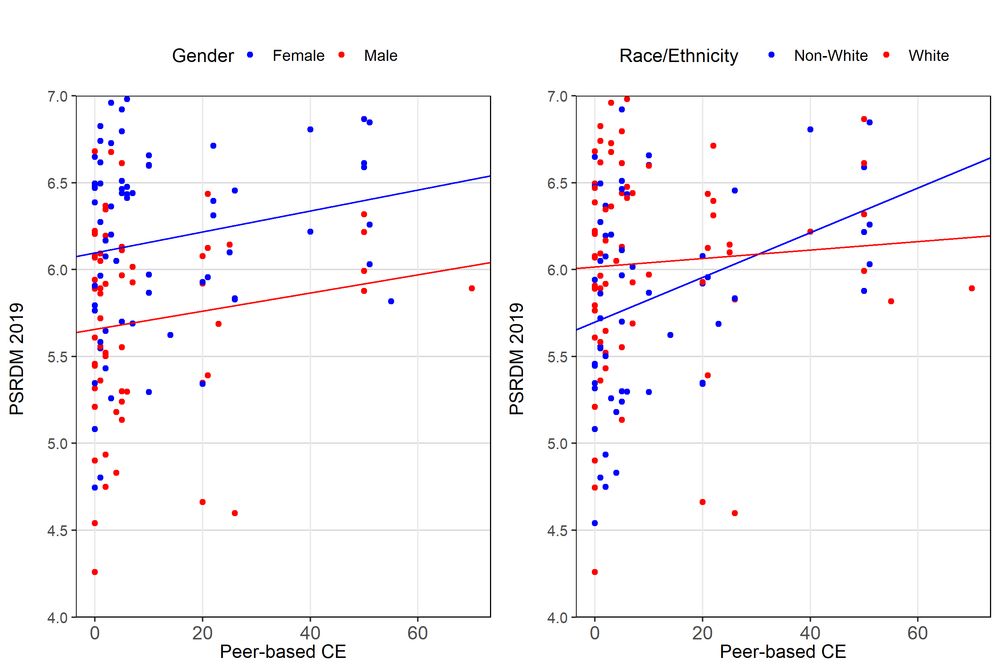
8/12 Crucially, this latter effect was especially pronounced for non-White students, suggesting peer interaction can be a key driver of equity-related development.
Another note: Women have higher SR scores than men consistently
11.07.2025 14:27 — 👍 1 🔁 0 💬 1 📌 0
7/12 🤝 Second, peer-based CE (like service through extracurriculars and through student groups).
This type of engagement does predict growth in overall social responsibility.
11.07.2025 14:27 — 👍 1 🔁 0 💬 1 📌 0
6/12 🏛️ But not all CE is the same. A novel part of our study was splitting CE into two types.
First, discipline-based CE (like professional internships). This type of engagement appears to foster professional dimensions of social responsibility, but not overall SR attitudes.
11.07.2025 14:27 — 👍 1 🔁 0 💬 1 📌 0
5/12 🌱 But there’s a potential counter-force: Community Engagement (CE).
Our key finding: students who participated more in community engagement showed significant growth in social responsibility attitudes, even after accounting for their pre-college views (and demographics).
11.07.2025 14:27 — 👍 1 🔁 0 💬 1 📌 0
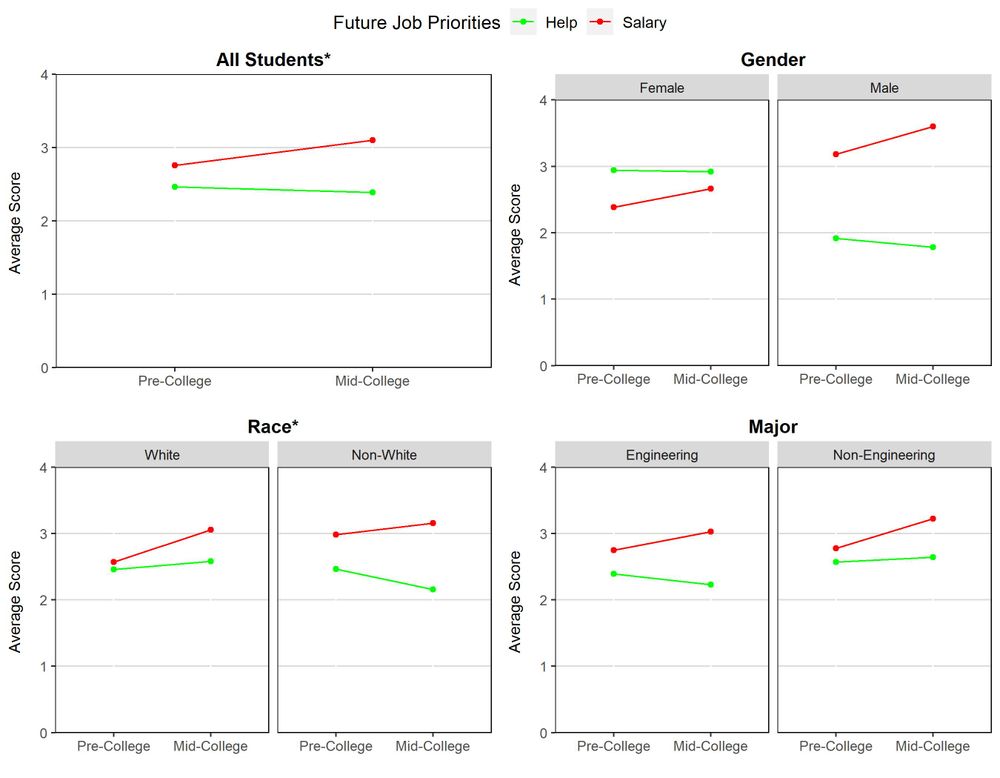
4/12 Worse, when asked about future job priorities, the importance of "salary" went up, while the importance of "helping people" went down.
11.07.2025 14:27 — 👍 1 🔁 0 💬 1 📌 0
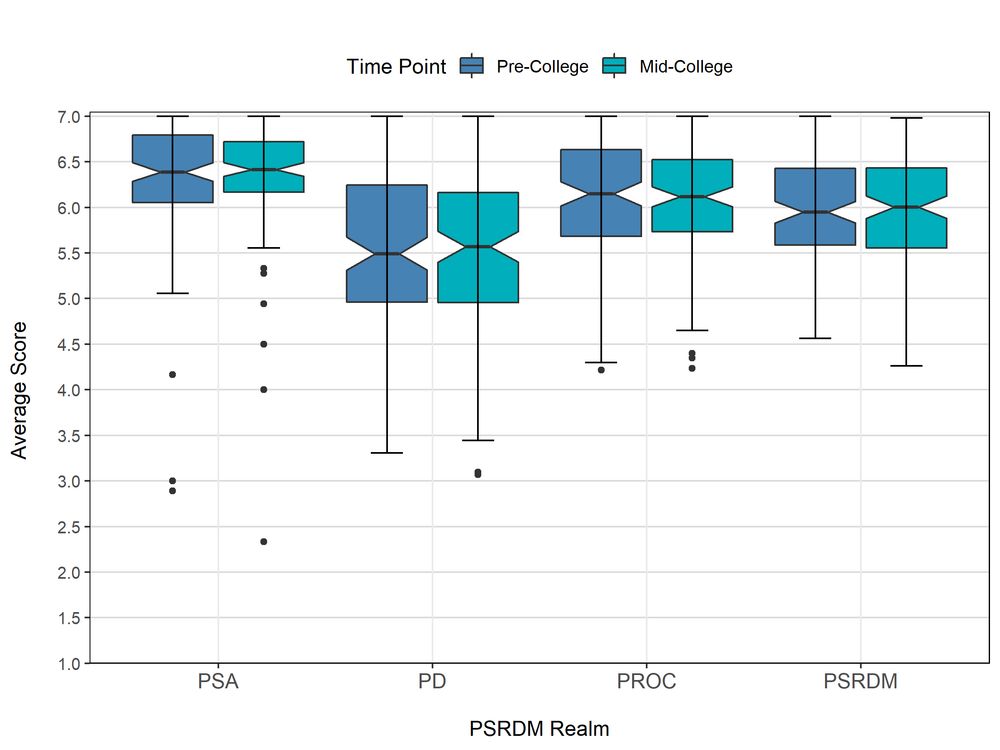
3/12 We used the Generalized Professional Responsibility Assessment (GPRA) to measure changes in their attitudes.
📉 Finding 1: Stagnant attitudes & shifting priorities.
Over two years, students' social responsibility scores remained flat.
11.07.2025 14:27 — 👍 1 🔁 0 💬 1 📌 0
2/12 🔧 How we studied this (with Jonna Lee, Jason Borenstein & Ellen Zegura at Ga Tech):
We ran a longitudinal study, surveying a cohort of 128 mostly STEM students both before they started college (2017) and again near the midpoint of their studies (2019).
11.07.2025 14:27 — 👍 1 🔁 0 💬 1 📌 0
1/12 🧵 Does college actually make students more socially responsible?
You might think so. But our new study in Studies in Higher Ed (doi.org/10.1080/030...) finds students' sense of social responsibility actually stagnates (or declines). 👇
@grailcenter.bsky.social
@purduepolsci.bsky.social
11.07.2025 14:27 — 👍 1 🔁 0 💬 1 📌 0
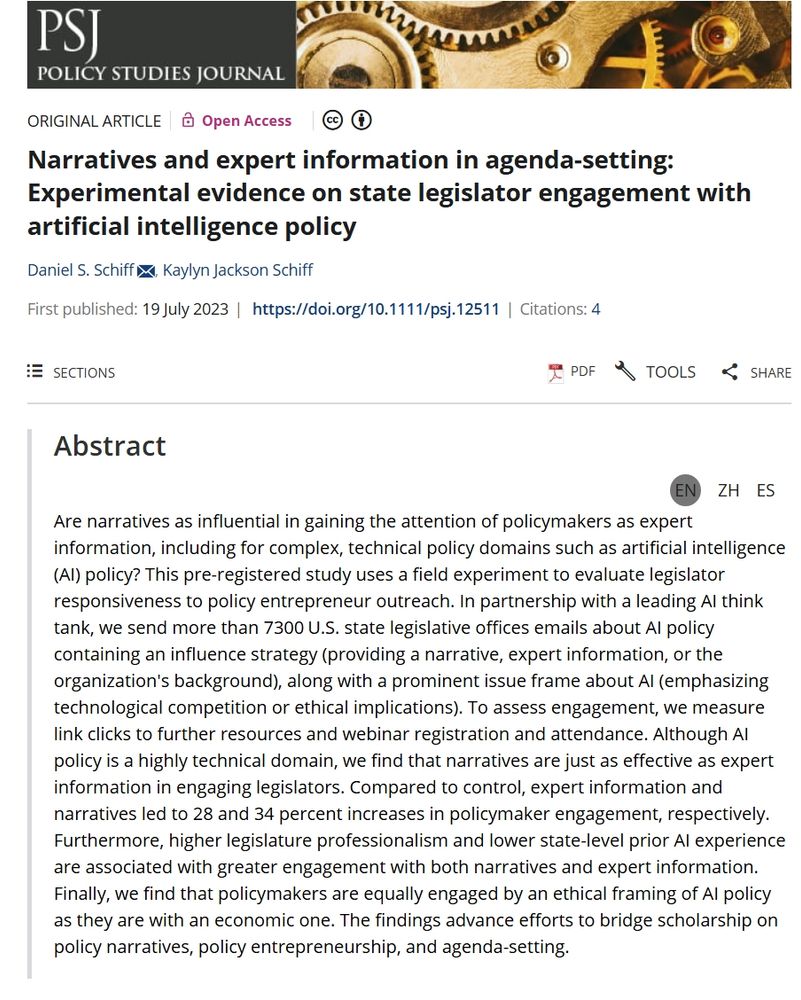
Can policy narratives be as effective as expert analysis in technical policy domains like AI? This open-access PSJ article says yes!
By @dschiff.bsky.social and Kaylyn Jackson Schiff
Read more here: doi.org/10.1111/psj....
#PSJ #PolicyStudiesJournal
17.06.2025 18:01 — 👍 3 🔁 2 💬 0 📌 0







